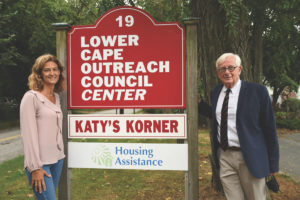PROVINCETOWN — First, the good news: checks of up to $5,000 are available to help vulnerable Cape Cod tenants with up to three months of rent payments.
The Housing Assistance Corp. (HAC), a nonprofit that disburses local, state, and federal housing money, has a unified application for assistance that can be used for several different sources of money. The underlying programs are complex, but the upshot is that any renter or home owner who makes less than Barnstable County’s median income ($67,700 for a one-person household; $87,000 for a three-person household) can apply for help, and HAC will try to find a source of funds that matches their situation.

Now, the bad news. Advocates are not just worried about tenants losing their homes: they’re worried about a broader loss of inventory if landlords leave the market. Cape Cod is uniquely dependent on small landlords — “individuals who had the capacity at some point to buy one or two or three houses and rent them out,” said Alisa Magnotta, CEO of HAC. If these landlords aren’t receiving rent payments and choose to sell their properties in the current very hot real estate market, then the already limited supply of year-round rentals could shrink further. Rental assistance programs are designed to help both tenants and landlords stay in place.
A Raft of Programs
The Workforce Housing Relief Fund was organized early in the pandemic, and it has raised $875,000 in private contributions. There is state money and a federal grant to Barnstable County. The towns of Brewster, Barnstable, and Yarmouth have allocated some of their Community Preservation Act money for emergency rental assistance. HAC uses a unified relief application for all of these programs, to make it easier for people who need help.
HAC also just announced a collaboration with the Lower Cape Outreach Council, which has a staffed office in Orleans. People in need of help can call (508-240-0694) or go to the office at 19 Brewster Cross Road, where the council offers food, clothing, and cash assistance, and HAC can help with money for housing.
Getting the word out is important, though, and landlords need to know about programs as much as tenants do. Rental assistance checks are cut directly to the landlord. (For home owners in distress who are eligible, checks go directly to the mortgage lender.) Many tenants in need aren’t comfortable asking for help, however. In particular, people who aren’t citizens — even permanent residents with green cards — can be very leery, even of nonprofit agencies.
“Some people have obstacles with technology, and aren’t comfortable over the phone,” said Magnotta. “So, we’re excited to be sending a staffer to the Orleans office every Monday morning to offer face-to-face help.”
Protecting the Inventory
If landlords who aren’t getting paid wind up selling into the hot real estate market, the current high prices pretty well ensure that the property won’t be a year-round rental again. It might become a short-term rental, or it might be reserved for an owner’s use, but, either way, year-round rentals, which are already hard to find on Cape Cod, could get even more scarce.
“Adding inventory, building units, is the number one strategy every town should be focused on, but we know we can’t build fast enough,” said Magnotta. “We don’t have the large apartment complexes that define this part of the market in cities. We are really dependent on the independent mom-and-pop investors. This rental assistance helps solve two problems. We want to avoid the extreme trauma of an eviction, and we want these land owners to keep their mortgages.”
HAC started a program called Rent365 in 2018 to encourage land owners to rent properties year-round. It worked to identify homes that were lightly used — some had been in a family for generations, but the current generation was rarely able to use them — and facilitate a transition to renting them year-round. HAC offers help with tenant selection procedures, local permitting rules, and even access to an attorney to help owners become landlords.
“We flipped 25 units into year-round rentals,” said Magnotta. “There’s a desperate need to build housing, but I think we also need to ask how to incentivize people to use their own assets in this way that benefits the larger community. One huge opportunity is to allow people to build accessory units on their property, by right. You also need to make investments in wastewater, because that’s how you keep construction costs low.”
HAC is part of the Future Cape Cod Coalition, along with the Cape Cod Chamber of Commerce, the Association to Preserve Cape Cod, and the Cape Cod & Islands Association of Realtors. The coalition was formed in 2019 to advocate for the future use of room occupancy taxes, now that short-term rentals are taxed the same as other hotel rooms and revenue is increasing. The coalition developed a model bylaw that would direct 50 percent of the room tax in each town to special infrastructure and community investment funds. The funds could be used for housing, wastewater, broadband, transportation, and town marketing projects.
“We don’t have this bylaw on any town warrants this year, because of Covid and what it’s done to town budgets,” said Magnotta. “We will pick it back up, though.”
